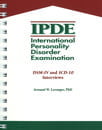
International Personality Disorder Examination ipde
For: Diagnose personality disorders using DSM-IV or ICD-10 criteria
Reading Level: Adult
Format: Paper-and-Pencil
Length: Interview 1 to 2 hours; Screener 15 minutes
Scoring: Hand Scored
Printed Kits
Click to browse products
Printed Forms & Handscoring Materials
Test forms, response booklets and scoring reference manuals.
IPDE Introductory Kit-DSM-IV Module
IPDE Introductory Kit-ICD-10 Module
IPDE-DSM-IV Module Answer Sheets (50)
IPDE-DSM-IV Module Scoring Booklets (15)
IPDE-DSM-IV Module Screening Questionnaires (25)
Author
Armand W. Loranger, PhD
Description
The IPDE was developed within the Joint Program for the Diagnosis and Classification of Mental Disorders of the World Health Organisation (WHO) and U.S. National Institutes of Health (NIH) and provides a uniform approach for assessing personality disorders for both the DSM-IV and the ICD-10 classification systems. The interview is the most widely used of its kind and is the only personality disorder interview based on worldwide field trials.
The IPDE Manual contains the interview questions to assess either the 11 DSM-IV or the 10 ICD-10 personality disorders. The two IPDE modules (DSM-IV and ICD-10) contain both a self-administered screening questionnaire and a semi-structured interview booklet with scoring materials.
The IPDE Screening Questionnaire is a self-administered carbonless form that contains 77 DSM-IV or 59 ICD-10 items written at a 4th-grade reading level. The patient responds either True or False to each item and may complete the questionnaire in 15 minutes or less. The clinician may quickly score the questionnaire and identify those patients whose scores suggest the presence of a personality disorder. Then the IPDE clinical interview may be administered.
Results from the IPDE Interview allow the examiner to assign a definite, probable, or negative diagnosis for each personality disorder. The IPDE Interview questions are arranged in a format that provides the optimal balance between a spontaneous, natural clinical interview and the requirements of standardisation and objectivity. The questions are arranged in sections (e.g. Background Information, Work, Self, Interpersonal Relationships) with open-ended inquiries provided at the beginning of each section to enable a smooth transition from the previous section. For each IPDE Interview question, the corresponding personality disorder and the specific diagnostic criterion is identified with precise scoring guidelines. Also at least one criterion must have been present prior to age 25 years before that particular personality disorder may be diagnosed. The clinician records the scores for each response on the appropriate IPDE Answer Sheet.
After the interview, the clinician transcribes the scores from the IPDE Answer Sheet to the appropriate Scoring Booklet. The 12-page Scoring Booklet contains a scoring page for each personality disorder. The cover page contains the personality disorder summary table with a confidence rating and diagnosis listed for each personality disorder and the Dimensional score profile. Dimensional scales provide scores on the traits underlying each of the categorical personality disorders, regardless of whether or not the patient has the disorder.
The IPDE has proven to be a user-friendly and clinically meaningful tool for clinicians throughout the international psychiatric community. It has demonstrated inter-rater reliability and temporal stability that is roughly similar to instruments used to diagnose psychoses, mood, anxiety and substance use disorders.
NB: Prices are in Australian dollars inclusive of GST. NZ customers need to log in to view ex-GST prices.



